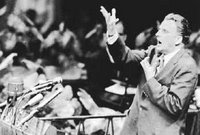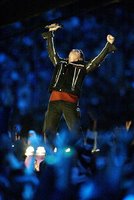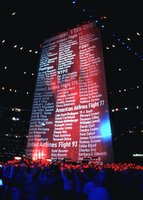 When we think of crusades several images come to mind: Medieval battles in the holy land, revival meetings, and Billy Graham evangelistic outreaches. More than any modern phenomenon, the Billy Graham crusade tops many westerners mental list of images when they hear that word. The last thing most people who share this familiarity with Billy's traveling ministry would think of when they hear the word ‘crusade’ is a handful of Irish rock stars with a penchant for outlandish sensory-overload concert presentations.
When we think of crusades several images come to mind: Medieval battles in the holy land, revival meetings, and Billy Graham evangelistic outreaches. More than any modern phenomenon, the Billy Graham crusade tops many westerners mental list of images when they hear that word. The last thing most people who share this familiarity with Billy's traveling ministry would think of when they hear the word ‘crusade’ is a handful of Irish rock stars with a penchant for outlandish sensory-overload concert presentations. But the sense of purpose that underlies a crusade was foundational in the bands beginnings. Early in their career Bono wrote the following to his father, "[God] gives us our strength and a joy that does not depend on drink or drugs. This strength will, I believe, be the quality that will take us to the top of the music business, … I hope our lives will be a testament to the people who follow us, and to the music business where never before have so many lost and sorrowful people gathered in one place pretending they're having a good time. It is our ambition to make more than good music."*
But the sense of purpose that underlies a crusade was foundational in the bands beginnings. Early in their career Bono wrote the following to his father, "[God] gives us our strength and a joy that does not depend on drink or drugs. This strength will, I believe, be the quality that will take us to the top of the music business, … I hope our lives will be a testament to the people who follow us, and to the music business where never before have so many lost and sorrowful people gathered in one place pretending they're having a good time. It is our ambition to make more than good music."* Making ‘more than good music’ has always characterized the band. There has always been a subtext to U2’s creations. Much of what they produced in the ‘90s defined post-modernism: The overload of the senses, ridiculously huge screens flashing words and images. This is post-modernity: many images, many messages and contradictions; Too much information, little truth. But one conversation kept running through the middle of all of this: It was a conversation steeped in Biblical imagery: A devil standing on top of the pinnacle of pop culture - the prince of this world saying “you’ve made me so famous, and I thank you;”** A cry out to God, sometimes in worship, sometimes in belief, often in pain, confusion, even anger. This Zooropa-Pop Mart journey often offended those whose culture was Christendom. They didn't speak this language. They wanted to hear from Billy, but his successors were already taking the pulpit.
The one who narrated this journey started out with a degree of clarity. The message was unmistakable: "You broke the bonds and loosed the chains, carried the cross of my shame. You know I believe it."** But then years of "I still haven't found what I'm looking for"** ensued. The images flashed, a western culture of excess filled the stage and overflowed out through MTV. Millions exalted. Few realized they were being parodied, made fun of; their culture exposed. And subtly through it all the same biblical message of truth whispered under the mess of imagery: "I'm not the only one, starring at the sun…"**
Then, in recent years the images quieted. As they slipped to the past, it became possible to hear the conversation that ran through them all. God's people living in a world of pain and injustice; A searching, struggling conversation with Jesus: "When I look at the world, I can't see what you see."** Frustration? Yes. A lack of faith or denial of God's goodness? No. Grace was lifted high. The conversation continued. The conversation itself is the message: ‘Yes, I'm sick of the trite, t-shirt slogan answers the church so often offers. Yes, I've seen intense suffering and injustice firsthand. But I know who to talk to about it. If there is any hope, I know where that hope lies.’ Quoting nightly from Psalm 116 (the message) Bono would pray, "What can I give back to God for the blessings he's poured out on me? I'll lift high the cup of salvation-a toast to God! I'll pray in the name of God; I'll complete what I promised God I'd do, And I'll do it together with his people."* The promise was there years ago in a letter to a now dead father. The completion of the promise seems immanent. The whispers have become clearer… but do whispers make a crusade?
In the same way that they failed to recognize the parody of the 90s, most people missed the crusade of the new millennium. It took place in all the same venues Mr. Graham once filled. They were, once again overflowing with people. They were, once again broadcast around the world. Here’s one of the largest of them:
 Super bowl, 2001, Halftime.
Super bowl, 2001, Halftime.The stadium lights have dropped; the massive building is dark, save a few stage lights. A small man dressed in dark clothes finishes singing a subtle, quiet lullaby and begins to slowly walk around a catwalk stage. A massive white sheet has fallen from the sky, a seemingly endless list of those who have died in the Sept 11th terrorist attacks slowly scroll up this huge white wall. The wall dwarfs the men on stage; it is the world’s largest gravestone. And the men who stand in front of it seem small, insignificant, even humble. Head down, the darkly clad man in the centre begins to whisper into the microphone. The guitar slowly rises behind him creating a building, sonic, wordless chant; a chant that is familiar to millions. Again and again he repeats the words of the psalmist: "Oh Lord, open my lips, that I might show forth thy praise."* He rounds the stage, and asks for the attention of a nation with one word, "America."* And then, head lifted heavenward, he utters an extended, guttural cry. He runs around the catwalk as the music builds. An unmistakable cry for heaven is sung out: "I want to run, I want to hide, I want to tear down the walls that hold me inside. I want to reach out and touch the flame … where the streets have no name."**
And there it is: Life, death, insignificance, fear, and a conversation: a plea to be able to worship, to speak of truth to a real, listening God, a cry for heaven. All that it takes to turn this into a crusade is an invitation. Billy used to say, "you come." But western culture was less jaded then. People knew where he was asking them to go. The post-modern sojourner can't simply sing, "Without one plea, but that your blood was shed for me, I come" He needs to wrestle through his pleas in all their futility. He needs to feel the message, perhaps even before he understands it. Millions have responded to U2’s ethereal gospel, but Bono has never said, "You come." There has never been an altar call for those still speaking the language of Judeo-Christianity. The altars were already rushed; the stadium floors were already filled.
This is the post-modern whisper crusade. The invitation is there. It permeates all that is happening. It is modeled rather than dictated to the masses. The one inviting knows what he is calling others to. He knows of whom he is speaking. He trusts that those who seek will find. He knows that the search has become too grating and deep to apply simple guarantees to. The invitees may or may not recognize the call, but the invitation stands just the same.
And one day, in the crystalline stadiums of kingdom come, Billy and Bono’s crowds will meet.
(Originally written in September, 2002).
* As quoted in an online article by Steve Beard: http://www.thunderstruck.org/u2.htm .
** Song quotes and narrative comments from various U2 concerts.
3 comments:
Looking forward to more of your essays.
Hi Rob,
Have you sent this to any Christian magazine for publication? I think it you should consider it if you haven't.
Love,
Mom
Post a Comment